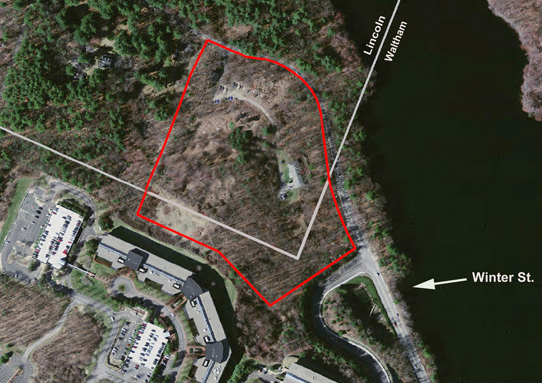
Hospice of the North Shore and Greater Boston purchased 12 acres of land in Lincoln and Waltham in hopes of building an inpatient hospice facility.
A Danvers-based hospice organization hopes to build a 20-bed inpatient hospice facility on Winter Street property straddling the Waltham city line, though there are no plans to alter the one-way status of the street.
In June, Hospice of the North Shore and Greater Boston (HNSGB) purchased the 12-acre parcel, which includes nine acres in Lincoln and three in Waltham. The Lincoln portion sold for $1.4 million. The only current structure is a single-family house on one of three Lincoln lots that were combined in the sale.
“This site is ideal for our purpose,” Diane Stringer, HNSGB president, said in a press release. “It is centrally located, close to Route 128 and easily accessible from the major cities and towns in our service area. It is also very serene and tranquil, as it is wooded, natural and offers views to the Cambridge Reservoir. Most importantly, it is more than large enough to accommodate the facility and have a large natural buffer from the road and neighbors.”
Winter Street in Lincoln is one-way heading north, but the hospice facility’s vehicular entrance and exit will be from the Waltham portion of the property. HNSGB representatives recently met informally at a pre-application “scoping session” with town officials to help plan the process of applying to the required town boards and commissions, “and they repeatedly said they have zero interest in making any change to that” one-way status, First Selectmen Peter Braun said at the September 9 Board of Selectmen meeting.
Inpatient hospice facilities offer a home-like setting where physicians, nurses and support staff provide 24-hour care, including pain and symptom management, and where visiting family members can spend quality time with their loved ones during the final weeks and days of life. Hospice care, which is covered by insurance and Medicare if the patient has a doctor’s prognosis of less than six months to live, can be an alternative to an expensive and disruptive hospital stay for many terminally ill patients.
“While the majority of hospice patients spend their final weeks in their own homes, a growing number have care needs that are simply too complex to be managed in the home setting,” Stringer said. “We’re also caring for more pediatric hospice patients, and there is no facility outside of a hospital that can provide the needed level of care for dying children and their families.”
The Lincoln/Waltham facility will be modeled on Kaplan Family Hospice House, HNSGB’s inpatient facility in Danvers. Staffing will include round-the clock nurses and nursing assistants, as well as a physician, social worker and chaplain on weekdays, according to a letter to the Lincoln Planning Board from Stringer.
HNSGB is the preferred hospice provider of the Partners Healthcare System, which includes Brigham and Women’s Hospital, Massachusetts General Hospital and Newton-Wellesley Hospital, as well as Emerson Hospital and three other hospitals. Since the company acquired Partners Healthcare’s hospice program in 2011, Kaplan House usually has a waiting list and is not easily accessible from many towns south and west of Boston that are now in HNSGB’s service area.
Because HNSGB is a nonprofit charitable organization, it would probably be exempt from paying property taxes on any Lincoln facility. However, selectmen expect there will be discussions with the company about payment in lieu of taxes (PILOT), such as Harvard University pays to the cities of Boston and Cambridge. “Large charitable institutions such an universities and hospitals know that’s something they have to discuss with local towns,” Braun said.
At one time, the Lincoln parcel (known as the “Kennedy property” in an 2005 analysis of six “at-risk” properties in town) was being considered for 40B affordable housing. According to that report, developing 135 affordable apartments on the site would have resulted in a net cost to the town of about $100,000 a year.
Leave a Reply